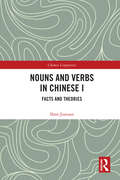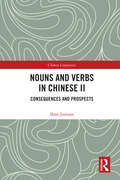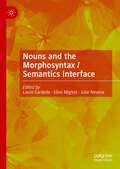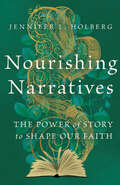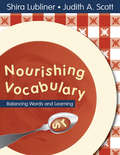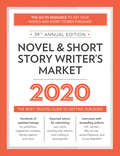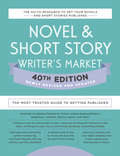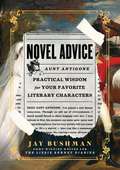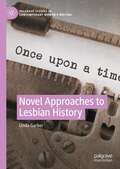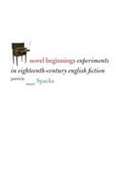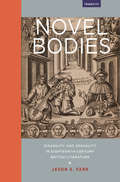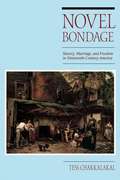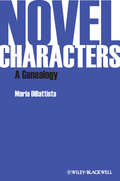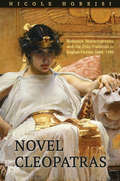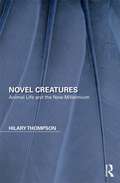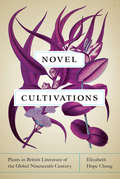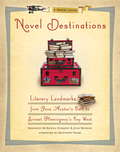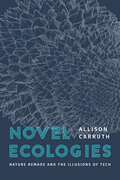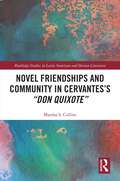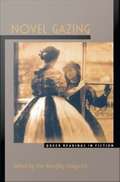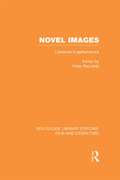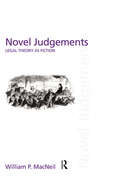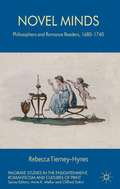- Table View
- List View
Nouns and Verbs in Chinese I: Facts and Theories (Chinese Linguistics)
by Shen JiaxuanAs the first volume of a two-volume set that re-examines nouns and verbs in Chinese, this book proposes the verbs-as-nouns theory, corroborated by discussions of the nature and relationship between nouns and verbs in Chinese. Seeking to break free from the shackles of Western linguistic paradigms largely based on Indo-European languages and to a great extent inappropriate for Chinese, this two-volume study revisits the nature of nouns and verbs and relevant linguistic categories in Chinese to unravel the different relationships between nouns and verbs in Chinese, English, and other languages. It argues that Chinese nouns and verbs are related inclusively rather than in the oppositional pattern found in Indo-European languages, with verbs included in nouns as a subcategory. Preliminary to the core discussion on the verbs-as-nouns framework, the author critically engages with the issues of word classes and nominalization, as well as problems with the analysis of Chinese grammar due to the noun-verb distinction. Through linguistic comparisons, the following chapters look into noticeable differences between Chinese and English, the referential and predicative natures of nouns and verbs, the asymmetry of the two, and the referentiality of predicates in Chinese. The volume will be a must-read for linguists and students studying Chinese linguistics, Chinese grammar, and contrastive linguistics.
Nouns and Verbs in Chinese II: Consequences and Prospects (ISSN)
by Shen JiaxuanAs the second volume of a two-volume set that re-examines nouns and verbs in Chinese, this book investigates a wide range of linguistic phenomena in Chinese and other languages to substantiate the verbs-as-nouns theory proposed by the author.In an attempt to break free from the shackles of Western linguistic paradigms, which are largely based on Indo-European languages and to a great extent inappropriate for Chinese, the two-volume set unravels the different relationships between nouns and verbs in Chinese, English, and other languages. This volume begins by looking at the problematic issues surrounding complements and adverbials in Chinese in order to explain the multifunctional nature of Chinese word classes. It then makes extensive use of evidence from other languages to explore the typology and evolution of word classes, as well as the cultural roots underlying the distinction between indicative and non-indicative negation in Chinese. In addition, it elucidates the significance and functions of monosyllabic and disyllabic combinations and the phenomenon of markedness reversal, shedding light on the subjectivity of the Chinese word class system.The volume is an important contribution to the study of Chinese linguistics, Chinese grammar, and contrastive linguistics.
Nouns and the Morphosyntax / Semantics Interface
by Laure Gardelle Elise Mignot Julie NeveuxThis edited book seeks to bridge a gap in the existing literature on nouns, by exploring the exact relationship between their formal and semantic characteristics. The introductory chapter offers a thorough state of the art on the morphosyntactic and semantic angles in definitions of nouns, provides evidence of misalignments between morphosyntactic and semantic features, and argues that a multi-criterial angle is in fact inherent in the definition of the class of nouns. The following chapters bring together a representative cross-section of international-level research on the morphosyntax/semantics interface for nouns, covering a wide variety of languages from French-based creoles, German and Japanese to English, French, Italian, Russian and Uzbek. The focus of the volume is to take a special focus on the currently underestimated dynamic interplay between morphosyntax and semantics, at both language and discourse levels. It will be of interest primarily to academics (specialists of nouns, as well as anyone interested in the interplay between morphology, syntax and semantics) and graduate students in areas such as syntax, semantics, morphology, theoretical linguistics and discourse analysis.
Nourishing Narratives: The Power of Story to Shape Our Faith
by Jennifer L. HolbergHumans are story-shaped creatures. We make sense of our world, pattern our lives, and reflect on what is ultimately significant through language and the words that compose our stories. But how does this relate to the narrative of the Bible and the story that God is writing through history? In Nourishing Narratives, writer and professor Jennifer Holberg engages with words from the likes of Dante, Gerard Manley Hopkins, Flannery O'Connor, Marilynne Robinson, and more while also offering some of her own stories to reflect on the importance of story to our lives and our faith. Here, readers are encouraged not only to understand how stories nourish our faith, but to discover how our stories are part of God's great story.
Nourishing Vocabulary: Balancing Words and Learning
by Judith A. Scott Shira I. LublinerFocuses on supporting students' academic development with targeted vocabulary instruction and provides strategies for vocabulary acquisition, read-alouds, independent reading, and decoding unknown words.
Novel & Short Story Writer's Market 2020: The Most Trusted Guide to Getting Published (Market #2020)
by Amy JonesThe best resource for getting your fiction published!Novel & Short Story Writer's Market 2020 is the go-to resource you need to get your short stories, novellas, and novels published. The 39th edition of NSSWM features hundreds of updated listings for book publishers, literary agents, fiction publications, contests, and more. Each listing includes contact information, submission guidelines, and other essential tips. This edition of Novel & Short Story Writer's Market also offers • Interviews with bestselling authors N.K. Jemisin, Min Jin Lee, James Patterson, and Curtis Sittenfeld. • A detailed look at how to choose the best title for your fiction writing. • Articles on creating antagonistic characters and settings. • Advice on working with your editor, keeping track of your submissions, and diversity in fiction.
Novel & Short Story Writer's Market 40th Edition: The Most Trusted Guide to Getting Published
by edited by Amy JonesThe best resource for getting your fiction published, fully revised and updatedNovel & Short Story Writer's Market is the go-to resource you need to get your short stories, novellas, and novels published. The 40th edition of NSSWM features hundreds of updated listings for book publishers, literary agents, fiction publications, contests, and more. Each listing includes contact information, submission guidelines, and other essential tips.This edition of Novel & Short Story Writer's Market also offers • Hundreds of updated listings for fiction-related book publishers, magazines, contests, literary agents, and more • Interviews with bestselling authors Celeste Ng, Viet Thanh Nguyen, Beverly Jenkins, and Chris Bohjalian • A detailed look at how to choose the best title for your fiction writing • Articles on tips for manuscript revision, using out-of-character behavior to add layers of intrigue to your story, and writing satisfying, compelling endings • Advice on working with your editor, keeping track of your submissions, and diversity in fiction
Novel Advice: Practical Wisdom for Your Favorite Literary Characters
by Jay BushmanFrom an Emmy Award–winning writer, witty and hilarious advice to classic literary characters—from Lady Macbeth to Victor Frankenstein—on how to cope with their most arduous, &“real-life&” struggles.What would happen if your favorite literary characters wrote in to ask for help from an advice columnist? What suggestions would Hester Prynne need to cope with the judgemental neighbors? What if Mrs. Bennett from Pride and Prejudice asked for tips about managing her financial woes? Emmy Award–winning writer Jay Bushman imaginatively considers those scenarios and dozens more as Aunt Antigone, the &“agony aunt&” who dishes practical advice, along with a fair dose of snark. Grouped by theme, Novel Advice features our favorite and most beloved literary characters from all genres as they write in to Aunt Antigone for help with their &“real-world&” problems. Discover what Aunt Antigone has to say when Ophelia and Ishmael ask about their dating woes, when Dr. Jekyll searches for the perfect work/life balance, or when Scarlett O&’Hara wants tips about the best way to handle stress. Perfect for fans of Texts from Jane Eyre, Tequila Mockingbird, and booklovers everywhere, this book is a hilarious and thought-provoking look at our favorite literary characters seeking help from an advice column with her own dramatic background.
Novel Approaches to Lesbian History (Palgrave Studies in Contemporary Women’s Writing)
by Linda GarberNovel Approaches to Lesbian History tells a tale about history and community in our allegedly post-identity era, examining contemporary novels that depict lesbian characters in recognizable historical situations. These imaginative stories provide a politically vital, speculative past in the face of a sketchy, problematic archive. Among the memorable characters in some 200 novels are pirates, cowgirls, and famous artists, ghosts and time travellers, immigrants and lovers. The best lesbian historical novels are conscientious and buoyant as they engage critical historiographical questions, but Novel Approaches also discusses the class and race biases that weigh on the genre. Some lesbian historical novels are based on archival evidence, others on conjecture or fantasy, but all convey the true fact that identity is elusive without a past, without which its future is nearly impossible.
Novel Beginnings: Experiments in Eighteenth-century English Fiction
by Patricia Meyer SpacksIn this study intended for general readers, eminent critic Patricia Meyer Spacks provides a fresh, engaging account of the early history of the English novel. Novel Beginnings departs from the traditional, narrow focus on the development of the realistic novel to emphasize the many kinds of experimentation that marked the genre in the eighteenth century before its conventions were firmly established in the nineteenth. Treating well-known works likeTom JonesandTristram Shandyin conjunction with less familiar texts such as Sarah Fielding's The Cry(a kind of hybrid novel and play) and Jane Barker'sA Patch-Work Screen for the Ladies(a novel of adventure replete with sentimental verse and numerous subnarratives), the book evokes the excitement of a multifaceted and unpredictable process of growth and change. Investigating fiction throughout the 1700s, Spacks delineates the individuality of specific texts while suggesting connections among novels. She sketches a wide range of forms and themes, including Providential narratives, psychological thrillers, romans à clef, sentimental parables, political allegories, Gothic romances, and many others. These multiple narrative experiments show the impossibility of thinking of eighteenth-century fiction simply as a precursor to the nineteenth-century novel, Spacks shows. Instead, the vast variety of engagements with the problems of creating fiction demonstrates that literary history-by no means inexorable-might have taken quite a different course.
Novel Bodies: Disability and Sexuality in Eighteenth-Century British Literature (Transits: Literature, Thought & Culture 1650-1850)
by Jason S. FarrNovel Bodies examines how disability shapes the British literary history of sexuality. Jason Farr shows that various eighteenth-century novelists represent disability and sexuality in flexible ways to reconfigure the political and social landscapes of eighteenth-century Britain. In imagining the lived experience of disability as analogous to—and as informed by—queer genders and sexualities, the authors featured in Novel Bodies expose emerging ideas of able-bodiedness and heterosexuality as interconnected systems that sustain dominant models of courtship, reproduction, and degeneracy. Further, Farr argues that they use intersections of disability and queerness to stage an array of contemporaneous debates covering topics as wide-ranging as education, feminism, domesticity, medicine, and plantation life. In his close attention to the fiction of Eliza Haywood, Samuel Richardson, Sarah Scott, Maria Edgeworth, and Frances Burney, Farr demonstrates that disabled and queer characters inhabit strict social orders in unconventional ways, and thus opened up new avenues of expression for readers from the eighteenth century forward. Published by Bucknell University Press. Distributed worldwide by Rutgers University Press.
Novel Bondage: Slavery, Marriage, and Freedom in Nineteenth-Century America
by Tess ChakkalakalNovel Bondage unravels the interconnections between marriage, slavery, and freedom through renewed readings of canonical nineteenth-century novels and short stories by black and white authors. Situating close readings of fiction alongside archival material concerning the actual marriages of authors such as Lydia Maria Child, Harriet Beecher Stowe, William Wells Brown, and Frank J. Webb, Chakkalakal examines how these early novels established literary conventions for describing the domestic lives of American slaves in describing their aspirations for personal and civic freedom. Exploring this theme in post-Civil War works by Frances E.W. Harper and Charles Chesnutt, she further reveals how the slave-marriage plot served as a fictional model for reforming marriage laws. Chakkalakal invites readers to rethink the "marital work" of nineteenth-century fiction and the historical role it played in shaping our understanding of the literary and political meaning of marriage, then and now.
Novel Characters: A Genealogy
by Maria DiBattistaNovel Characters offers a fascinating and in-depth history of the novelistic character from the “birth of the novel” in Don Quixote, through the great canonical works of the nineteenth and twentieth centuries, to the most influential international novels of the present day An original study which offers a unique approach to thinking about and discussing character Makes extensive reference to both traditional and more recent and specialized academic studies of the novel Provides a critical vocabulary for understanding how the novelistic conception of character has changed over time. Examines a broad range of novels, cultures, and periods Promotes discussion of how different cultures and times think about human identity, and how the concept of what a character is has changed over time
Novel Cleopatras: Romance Historiography and the Dido Tradition in English Fiction, 1688–1785
by Nicole HorejsiAdvocating a revised history of the eighteenth-century novel, Novel Cleopatras showcases the novel’s origins in ancient mythology, its relation to epic narrative, and its connection to neoclassical print culture. Novel Cleopatras also rewrites the essential role of women writers in history who were typically underestimated as active participants of neoclassical culture, often excluded from the same schools that taught their brothers Greek and Latin. However, as author Nicole Horejsi reveals, a number of exceptional middle-class women were actually serious students of the classics. In order to dismiss the idea that women were completely marginalized as neoclassical writers, Horejsi takes up the character of Dido from ancient Greek mythology and her real-life counterpart Cleopatra, the queen of Egypt. Together, the legendary Dido and historical Cleopatra serve as figures for the conflation of myth and history. Horejsi contends that turning to the doomed queens who haunted the Roman imagination enabled eighteenth-century novelists to seize the productive overlap among the categories of history, romance, the novel, and even the epic.
Novel Creatures: Animal Life and the New Millennium (Perspectives On The Non-human In Literature And Culture Ser.)
by Hilary ThompsonNovel Creatures takes a close look at the expanding interest in animals in modern fiction and argues that the novels of this time reveal a dramatic shift in conceptions of "creatureliness." Scholars have turned to the term "creaturely" recently to describe shared aspects of human and animal experience, thus moving beyond work that primarily attends to distinctions between the human and the animal. Carrying forward this recent scholarship, Novel Creatures argues that creatureliness has been an intensely millennial preoccupation, but in two contrasting forms—one leading up to the turn of the century, the other after the tragic events of 9/11.
Novel Cultivations: Plants in British Literature of the Global Nineteenth Century (Under the Sign of Nature: Explorations in Ecocriticism)
by Elizabeth Hope ChangNineteenth-century English nature was a place of experimentation, exoticism, and transgression, as site and emblem of the global exchanges of the British Empire. Popular attitudes toward the transplantation of exotic species—botanical and human—to Victorian greenhouses and cities found anxious expression in a number of fanciful genre texts, including mysteries, science fiction, and horror stories.Situated in a mid-Victorian moment of frenetic plant collecting from the far reaches of the British empire, Novel Cultivations recognizes plants as vital and sentient subjects that serve—often more so than people—as actors and narrative engines in the nineteenth-century novel. Conceptions of native and natural were decoupled by the revelation that nature was globally sourced, a disruption displayed in the plots of gardens as in those of novels.Elizabeth Chang examines here the agency asserted by plants with shrewd readings of a range of fictional works, from monstrous rhododendrons in Daphne du Maurier’s Rebecca and Mexican prickly pears in Olive Schreiner’s Story of an African Farm, to Algernon Blackwood’s hair-raising "The Man Whom the Trees Loved" and other obscure ecogothic tales. This provocative contribution to ecocriticism shows plants as buttonholes between fiction and reality, registering changes of form and content in both realms.
Novel Destinations: Literary Landmarks From Jane Austen's Bath to Ernest Hemingway's Key West
by Mckenna Schmidt ShannonPeppered with great reading suggestions and little-known tales of literary gossip, Novel Destinations is a unique travel guide, an attractive gift book, and the ultimate browser's delight.
Novel Ecologies: Nature Remade and the Illusions of Tech
by Allison CarruthTracing the convergence of ecology and engineering over the last three decades, this book pinpoints a new environmental paradigm that the author calls Nature Remade. Allison Carruth’s Novel Ecologies shows how the tech industry has taken up the wilderness mythologies that shaped one strain of American environmentalism over the last century. Calling this twenty-first-century environmental imagination Nature Remade, Carruth describes a distinctly West Coast framework that is at once nostalgic and futuristic. Through three case studies (synthetic wildlife, the digital cloud, and space colonization), the book shows Nature Remade to be a quasi-religious belief in venture capitalism and big tech. This paradigm thus imagines a future in which species, ecosystems, and entire planets are re-generated and re-created through engineering. Novel Ecologies challenges the conviction that climate change and other environmental crises must be met with ever larger-scale forms of technological intervention. Against the new worlds conjured by Google, Meta, Open AI, Amazon, SpaceX, and a host of lesser-known start-ups, Carruth marshals writers and artists who imagine provisionally hopeful environmental futures while refusing to forget the histories that have made the world what it is. On this track of the book, Carruth discusses the works of Octavia Butler, Becky Chambers, Jennifer Egan, Ruth Ozeki, Craig Santos Perez, Tracy K. Smith, Jeff VanderMeer, Saya Woolfalk, and many more. Their novels, poems, installation artworks, and expressive media offer a speculative world built on livable communities rather than engineered lifeforms.
Novel Friendships and Community in Cervantes’s “Don Quixote” (Routledge Studies in Latin American and Iberian Literature)
by Marsha S. CollinsNovel Friendships and Community in Cervantes’s “Don Quixote” analyzes Don Quixote through the critical lens of friendship studies. Turning a critical spotlight on the friendship between Don Quixote and Sancho Panza, this book examines the formation, growth, and dynamics of their friendship as the nucleus of the first modern novel in the West and the source of the work’s enduring power. Novel Friendships also examines the theme of amity in relation to the evolving concept of community as a throughline in Cervantes’s fiction—before, during, and after Don Quixote. This book shows the power of the arts, especially storytelling, to build friendships and foster community, and highlights how Cervantes deploys fiction to cultivate his readers’ sense of friendship and to create a community of readers. Novel Friendships suggests that today’s readers may find Cervantes’s views on amity and community highly relevant to the contemporary world.
Novel Gazing: Queer Readings in Fiction
by Eve Kosofsky SedgwickNovel Gazing is the first collection of queer criticism on the history of the novel. The contributors to this volume navigate new territory in literary theory with essays that implicitly challenge the "hermeneutic of suspicion" widespread in current critical theory. In a stunning introductory essay, Eve Kosofsky Sedgwick delineates the possibilities for a criticism that would be "reparative" rather than cynical or paranoid. The startlingly imaginative essays in the volume explore new critical practices that can weave the pleasures and disorientations of reading into the fabric of queer analyses. Through discussions of a diverse array of British, French, and American novels--including major canonical novels, best-sellers, children's fiction, and science fiction--these essays explore queer worlds of taste, texture, joy, and ennui, focusing on such subjects as flogging, wizardry, exorcism, dance, Zionist desire, and Internet sexuality. Interpreting the works of authors as diverse as Benjamin Constant, Toni Morrison, T. H. White, and William Gibson, along with canonical queer modernists such as James, Proust, Woolf, and Cather, contributors reveal the wealth of ways in which selves and communities succeed in extracting sustenance from the objects of a culture whose avowed desire has often been not to sustain them. The dramatic reframing that these essays perform will make the significance of Novel Gazing extend beyond the scope of queer studies to literary criticism in general. Contributors. Stephen Barber, Renu Bora, Anne Chandler, James Creech, Tyler Curtain, Jonathan Goldberg, Joseph Litvak, Michael Lucey, Jeff Nunokawa, Cindy Patton, Jacob Press, Robert F. Reid-Pharr, Eve Kosofsky Sedgwick, Melissa Solomon, Kathryn Bond Stockton, John Vincent, Maurice Wallace, Barry Weller
Novel Images: Literature in Performance (Routledge Library Editions: Film and Literature)
by Peter ReynoldsWritten specifically with the student in mind and focusing on a number of well-known texts, including Les Liaisons Dangereuses, Nicholas Nickleby, Nice Work and The Color Purple, the contributions in this book demonstrate how we can look critically at literary adaptations and learn to distinguish between mythical images and the reality of the process that constructed them. They argue that adaptations should not be seen as secondary or marginal, because through them we can enter into an exciting debate with the literary text itself. Originally published in 1993.
Novel Judgements: Legal Theory as Fiction
by William P. MacNeilNovel Judgements is a book about nineteenth century Anglo-American law and literature. But by redefining law as legal theory, Novel judgements departs from ‘socio-legal’ studies of law and literature, often dated in their focus on past lawyering and court processes. This texts ‘theoretical turn’ renders the period’s ‘law-and-literature’ relevant to today’s readers because the nineteenth century novel, when "read jurisprudentially", abounds in representations of law’s controlling concepts, many of which are still with us today. Rights, justice, law’s morality; each are encoded novelistically in stock devices such as the country house, friendship, love, courtship and marriage. In so rendering the public (law) as private (domesticity), these novels expose for legal and literary scholars alike the ways in which law comes to mediate all relationships—individual and collective, personal and political—during the nineteenth century, a period as much under the Rule of Law as the reign of Capital. So these novels pass judgement—a novel judgement—on the extent to which the nineteenth century’s idea of law is collusive with that era’s Capital, thereby opening up the possibility of a new legal theoretical position: that of a critique of the law and a law of critique.
Novel Minds
by Rebecca Tierney-HynesEighteenth-century philosophy owes much to the early novel. Using the figure of the romance reader this book tells a new story of eighteenth-century reading. The impressionable mind and mutable identity of the romance reader haunt eighteenth-century definitions of the self, and the seductions of fiction insist on making an appearance in philosophy.
